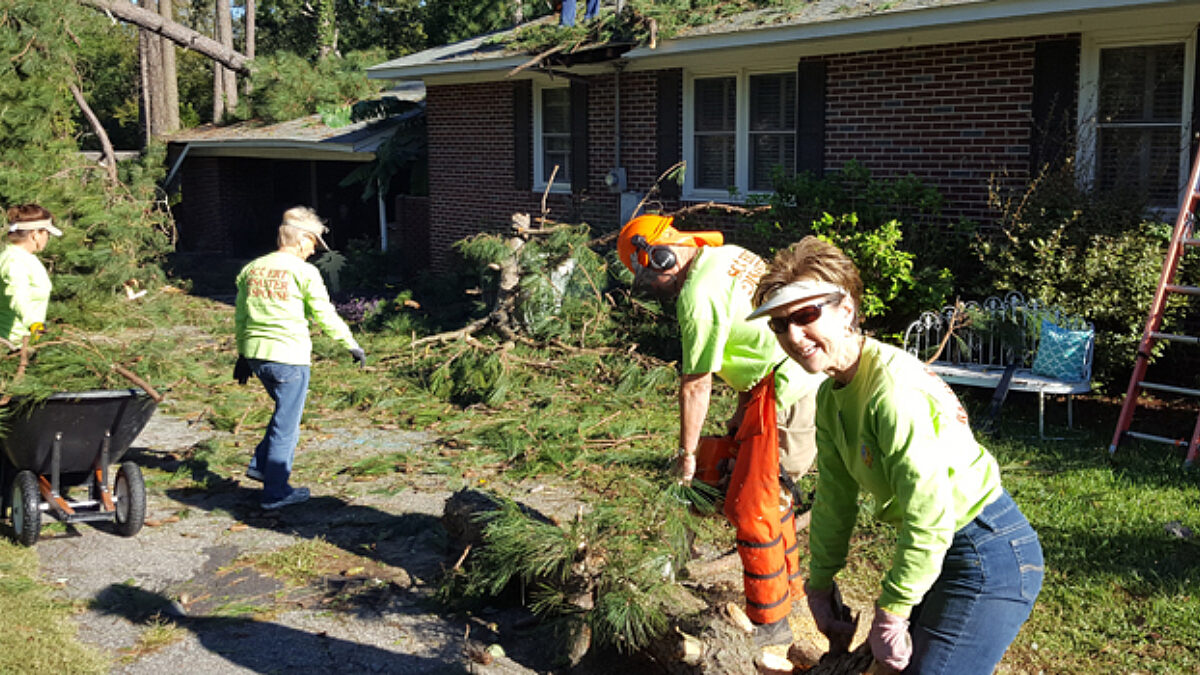
South Carolina gets help after the hurricane
Disaster hotline now live as UMCSC sends response teams,
cleaning buckets, health kits to people in need
By Jessica Brodie
Two days after Hurricane Matthew pummeled South Carolina, United Methodist disaster leaders are rolling up their sleeves and getting to work. Their first order of business: assessment and early response.
Six of the 12 districts in the South Carolina Conference of The United Methodist Church have seen damage from the storm, several of those with massive flooding, and the conference has opened up its disaster response hotline to begin helping people in need.
The hotline is 800-390-4911, or email [email protected]. The Spanish-language hotline is 844-344-2270.
“We know we have a lot of work to do,” said Matt Brodie, conference disaster response coordinator. “In terms of a recovery effort, it’s very similar to what we had with the flood except it’s more concentrated—instead of most of the state, it’s mainly I-95 to the coast.”
Brodie said it’s not just the coastal districts that have seen damage, though certainly they took the brunt. Some parts of Hilton Head Island are literally gone, he said, and parts of Charleston and Myrtle Beach were devastated. But many inland areas were hard hit, as well. The Florence and Hartsville districts saw major flooding, and downed trees plagued the Orangeburg District.
South Carolina United Methodist Volunteers in Mission Early Response Teams have already begun work where able, and trucks of United Methodist Committee on Relief cleaning buckets and health kits are being distributed in affected areas.
Brodie said the biggest need right now is for churches in affected areas to house early response teams. Other major needs include financial donations (click here to donate online) and churches to assemble cleaning buckets and health kits.
The conference has applied for an UMCOR grant to help with the recovery effort, and Brodie and his team are working with the state Volunteer Organizations Active in Disasters to collaborate on aid. Last week, the UMCSC distributed a number of health kits to Harvest Hope food bank, and they continue working with other groups on ways to help people in need.
Chuck Marshall, disaster response coordinator for the Spartanburg District, will be working in Columbia this week doing trainings and coordinating ERTs both in- and out-of-state.
The six UMCSC districts that experienced no hurricane damage will be partnering with the six affected districts to assist them in disaster response, fielding calls and providing as much direct support as possible. The six affected districts are the Charleston, Florence, Hartsville, Marion, Orangeburg and Walterboro districts.
“We are up and running and actively looking for unmet needs in the community,” Brodie said, noting that even if the UMC teams cannot help directly, they can put people in touch with groups that can.
Current needs
[caption id="attachment_5145" align="alignright" width="300"]
 Evacuees Deena Flessas, her children Ben and Madeleine, and their dog, Rudy, stop at Mt. Zion UMC, Swansea, which offered residents fleeing the coast free water, snacks and restrooms.[/caption]
Evacuees Deena Flessas, her children Ben and Madeleine, and their dog, Rudy, stop at Mt. Zion UMC, Swansea, which offered residents fleeing the coast free water, snacks and restrooms.[/caption]- Churches in affected areas willing to house disaster response teams (contact [email protected] or 803-786-9486);
- Churches in affected areas willing to act as distribution centers for relief supplies such as cleaning buckets and health kits, and possibly partner with other organizations with their supply efforts (contact [email protected] or 803-786-9486);
- People to get trained to serve on Early Response Teams; the next official training is Oct. 29, but the conference is considering an earlier training, as well (contact [email protected] or 803-786-9486);
- People to donate to the UMCSC disaster response fund; funds will help ERTs pay for fuel, supplies, tarps, chainsaws and other necessary tools for the response effort (donate online here);
- People to donate or lend vehicles and supplies, such as box fans for drying flooded homes, a shower trailer for teams or a large pickup truck (Ford F250-style or equivalent) that can haul the relief trailers (contact [email protected] or 803-786-9486);
- People to help assess areas and figure out community needs (contact your district office here with information you discover)
- People to make health kits and cleaning buckets (go here for instructions on how to assemble and what to include); and
- People with big vehicles to haul large quantities of the cleaning buckets and health kits to the distribution centers (contact [email protected] or 803-786-9486).
About the hurricane
The hurricane’s northern eyewall struck Hilton Head Island as a Category 2 storm very early Saturday, Oct. 8, and continued north, weakening to a Category 1 and making landfall in McClellanville, a small town between Charleston and Myrtle Beach. Flooding from the storm-surge soon followed, with whole neighborhoods swamped, piers demolished, trees uprooted and, in Charleston, waist-level flooding in some parts. Hurricane Matthew was a Category 4 storm when it slammed Haiti Oct. 4, killing nearly 900 people and then moving onto Florida, where it claimed the lives of at least six more people before moving north. At least 21 people died in the United States as a result of the storm, including three in South Carolina.

Jessica Brodie is editor of the South Carolina United Methodist Advocate. She can be reached at [email protected].